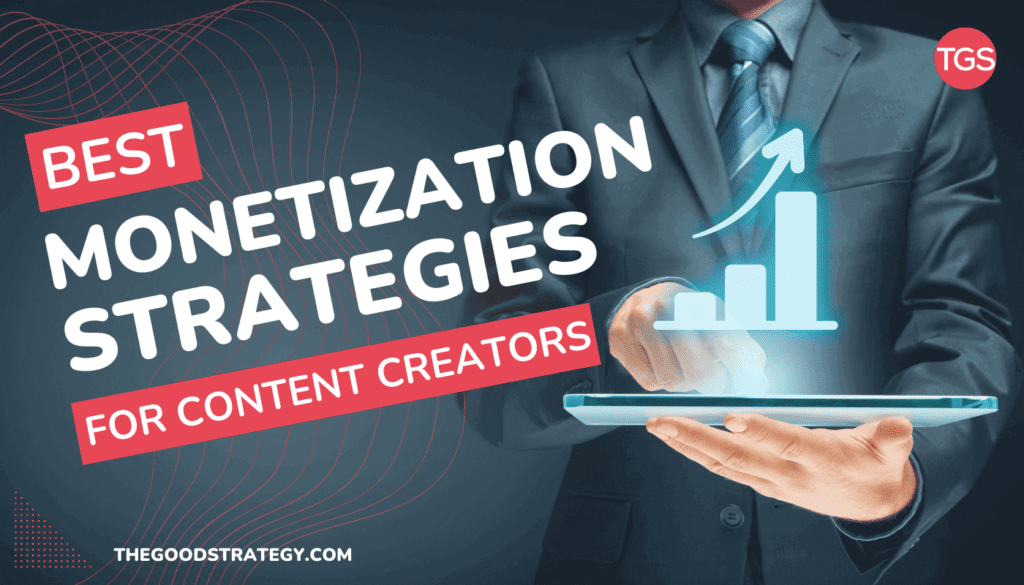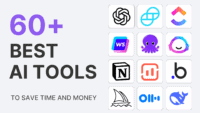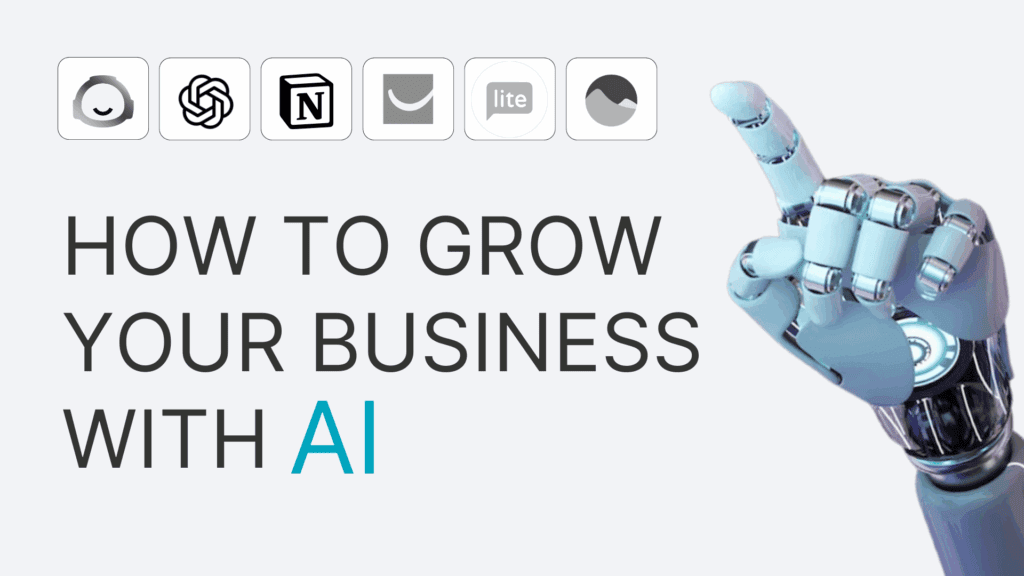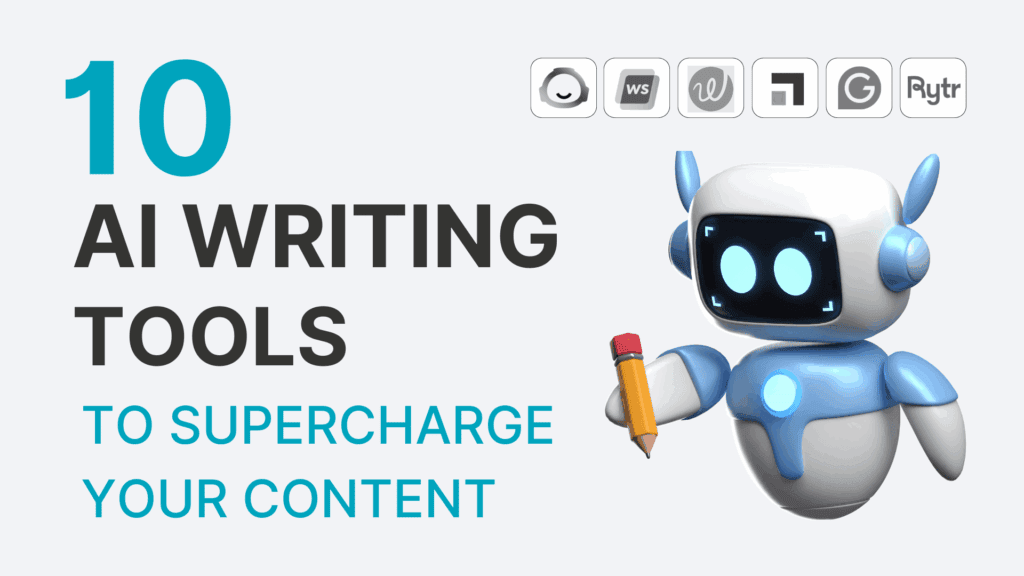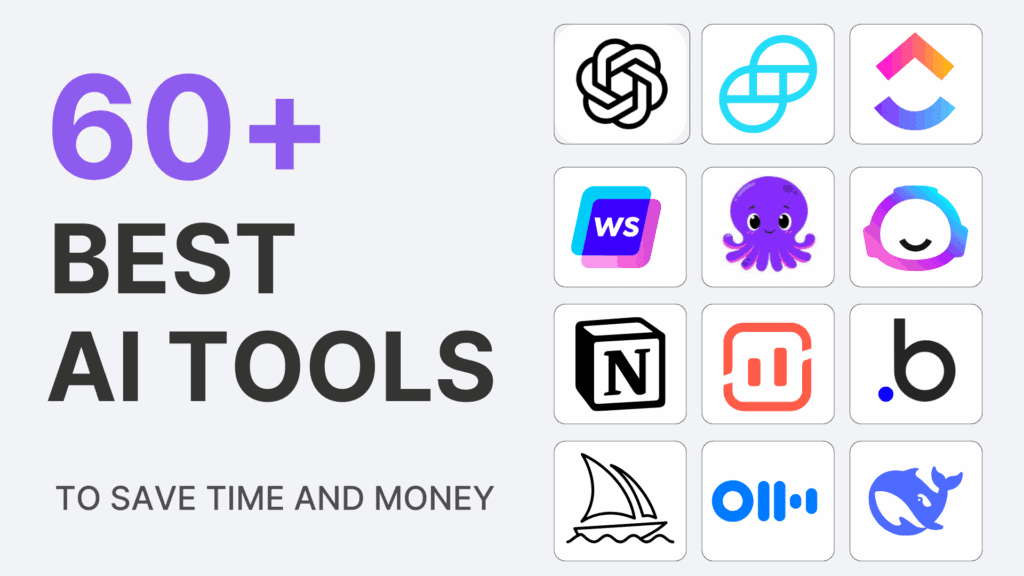The Creator Economy continues to strive and making money online with your content has never been as accessible as nowadays. Everyone can make money online and it is quite an easy concept. But most of the time, content creators rush through the execution and for the most part, fail to build and scale income. Why? Either because they use the wrong methods not suited to their business model, or they tend to monetize content too early and give up too soon.
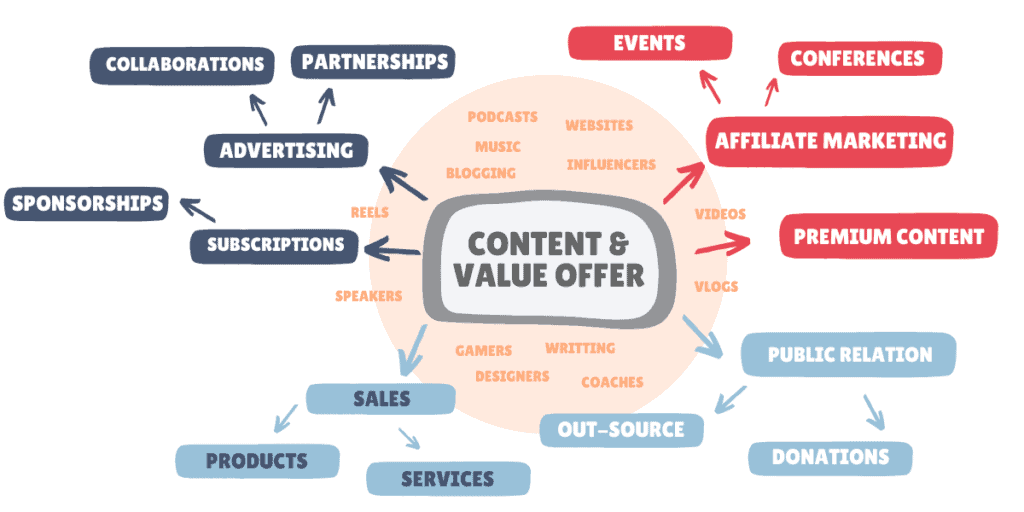
Well, in this guide, we will cover the best content monetization strategies to help you build, scale, and, diversify your revenue at the right time, on your own schedule, and done the right way from creating and publishing content your audience love. And the best part is that you only need an internet connection to create an offer, build content and monetize it. Ready? Let’s dive right in!
Advertising
Advertising may be the first form of content monetization that comes to mind. This tactic refers to any form of content monetization that happens through third-party platforms. If you have a solid audience engaging with your content on a regular basis and you have a well-trafficked website or blog with high engagement rates, you can decide to monetize your content by offering advertisers space and placement on your site or social media. Selling ad space is usually an automated process done through display or programmatic advertising programs. You don’t own the products or services you promote on your website or blog. For example, platforms like Youtube or Google Adsense will select the best ads to display on your site based on audience targeting and interests. Ad formats can take many forms such as native ads, interstitial ads, video ads, pre-rolls, display banners, etc.
While running ads on your website or social media accounts is the most well-known, easiest, and well-established monetization tactic to put in place to earn money online. You can also directly work with advertisers to offer media placements on your website, emails, or social media. This method is more personalized and you will have more flexibility to decide the pricing and rates than through automated platforms like Adsense.
If you run content or a blog, advertising is a cost-effective and time-saving method to earn passive income. Criteria to advertise with platforms may be very restrictive but it is a great way to monetize your content.
If you are a brand building and selling products and looking to expand trust and authority, we recommend staying away from this method though. That can distract your website visitors and customers, leaving them with a poor online experience with your site. We suggest you work with directly paid partnerships or build your own affiliate program instead to protect your brand and online reputation.
Best content format: How-to’s, tutorials, daily vlogs, high-funnel educational content, clickbait content, and any posts of content with high traffic potential.
Pricing and Payment Model: Direct advertising programs and platforms usually offer to pay publishers based on CPM – or cost per thousand impressions. You earn revenue each time a CPM ad is served to your page and viewed by a user. CPM is usually earnings before revenue share.
Ad Platforms: There are many advertising platforms and ad servers that work with publishers and advertisers. Amongst them, you have the most well-known partners such as Google Adsense, Youtube ads, Outbrain, AdRoll, or Taboola.
Affiliate Marketing
Affiliate Marketing is one of the most effective and profitable ways to monetize content and make money online. There are two ways you can leverage affiliate marketing.
- As an advertiser – you have the offer to promote to a new audience and want to expand your reach and sales. For that, you can create an affiliate program and recruit publishers that will share your offer with their audiences. In exchange for visibility and conversion, you will pay publishers a commission.
- As a publisher – YOU create content and monetize traffic with affiliate links from advertisers’ offers. For any referred sales or signups, you will receive a commission from the advertiser.
Using affiliate marketing is one of the most rewarding and profitable ways to build passive income and to promote products and services that people are already actively searching to buy.
There are some niches and industries that have affiliate business model that can pay high one-time commissions and also that offers recurring payouts. We reviewed the best affiliate programs by niches and industries that offer high-paying commissions. If you manage a travel site or work with SaaS brands, affiliate payouts are very attractive in these industries.
But if you are just getting started building an affiliate site, learn more about free traffic sources for affiliate marketing that can help you drive thousands of organic affiliate clicks without breaking the bank.
Best content format: product and service reviews, comparisons, how-tos, editorial blogs, loyalty and coupon offer sites, etc.
Pricing and Payment Model: the most widely used payout model for affiliate marketing is CPA (cost per action). This is a performance-based model where you can get a commission on sales, email signups, product trials, app downloads, or any action or goals set up by the advertiser. Commissions payouts are either a flat fee or % of the specific action.
Platforms: Most of the affiliate programs are managed through affiliate networks such as Impact Radius, CJ, Refersion, and ShareSale, or are directly self-hosted by the advertiser. As an Affiliate (publisher), you will get access to all your affiliate links, assets, and performance and payout reports. We reviewed the best affiliate marketing tools to help content creators, bloggers, affiliates, and marketers, get started or scale their affiliate sites.
Online Courses / Selling your own products or services
Another popular way to monetize your content is to create an offer that your audience values and that will solve their problems. For example, creating an online course created by a fitness coach to help them sell class memberships or help them book more customers. In this case, you create and sell your own product or services. You can also promote it through your owned media such as your website, your social media, etc. You can also partner with other third-party platforms to support selling your courses or products. Online learning is a growing market with many opportunities to put your skills and knowledge into action.
If you are an expert in your niche and have built credibility and authority in a particular space, selling your online courses or content should be the natural next step to monetizing your activity. In the example of online courses, you can monetize an offer broken down into organized lessons and learning activities with weekly webinars, videos, and discussions, and create an exclusive group for your “students” to follow up with questions and share more content with other members.
Best content format: Online courses, pre-recorded video courses, webinars, extensive e-books, etc.
Pricing and Payment Model: In this model, you set your own price. You should take into consideration the existing market and competitors’ pricing model, the average price your audience will be willing to pay, and make sure to cover any expenses and costs tied to creating and promoting your content. For example digital creators can charge from $49 up to $999 for an online course based on the value, length, quality, and other factors related to production and marketing costs. Pricing is usually a flat fee or a single one-time payment.
Platforms: There are many platforms that can help you create, manage, host, and promote your online content or digital products. We tested and explored the functionalities of the following online course platform and they are amongst the best for content creators looking to monetize their online courses or services: Teachable, SamCart, Thinkific, and Podia.
Premium Content and Subscriptions
With premium content, you offer exclusive rights to your audience to access additional content complementary to what you already create on a regular basis. Your subscribers will pay to access premium content.
Subscriptions slightly differ from premium content in that subscription, paid for by the consumer, promise to deliver content ongoing, over a period of time (generally a year or more).
Best content format: Premium Content offered to paid subscribers can take many forms: it can be premium articles, research, blog content, webinars, email newsletters, private community, and access VIP groups and forum discussions, etc.
Pricing and Payment Model: There are two ways to monetize your exclusive content, either by charging a one-time fee or annual or unlimited access to your premium content, or charge a monthly subscription fee to extend your audience engagement in the long term and to increase your recurring revenue for this monetization tactic.
Subscriptions Platforms: There are many creator-focused subscription services out there that will help you deliver your content, videos, music, designs, etc. Patreon is one the best platform and the most cost-effective and easy-to-manage solution to create, organize and manage subscribers’ payments.
Consulting Services
Consulting is a great way to make money by monetizing your knowledge and expertise. It can be an upsell to an online course you also offer. Consulting services generate more active revenue than creating and selling an online course or monetizing content through affiliate links, which drive more passive income.
Expert advice in a specific niche can be extremely lucrative. If you have to establish your personal brand or build trust and authority in your niche, you can charge up to $400 an hour for strategic guidance or one-time discussion with clients.
Best content format: 1:1 consulting session, remote training, strategy, business coaching, etc.
Pricing and Payment Model: Consulting services can be charged at an hourly rate or based on a specific project. Hourly rates are usually the best way to keep track of profitability and true time spent consulting with clients.
Platforms: You can easily set up and organize your time and sessions with ClickMeeting. For Payment and billing solutions, get paid fast and easily with Paypal, Square, or FreshBooks.
Donations
Content monetization with donations is a great model in which you can rely on financial contributions from your audience to support your work. This monetization tactic is easy to set up and great for independent creators, artists, writers, musicians, podcasters, influencers, or if you work as a not-for-profit or cause organization. It is also a way to build a direct relationship with your audience.
To use donations as a model to monetize your content, it is essential to create high-quality, engaging content that resonates with your audience. Value authenticity and content should provide value to the viewers, and they should be unique and relevant.
Creators should build genuine content to engage with their audience and build trust and loyalty. You can also utilize social media to promote your content on social media and other platforms to reach a wider audience.
Best content format: Exclusive tips and blog content, podcasts, blogs, Youtube videos, or any channel that can help you build a community will incentivize donations.
Pricing and Payment Model: You can set up monthly or per-creation donation tiers or set a fixed donation amount, and the platform takes a percentage of the donation as a processing fee.
Platforms: Donations can be made in various ways, such as through crowdfunding platforms, social media apps, or dedicated donation tools such as Patreon, Ko-fi, and Kickstarter. Social media apps like Twitter and Instagram also offer donation features, and you can use donation tools like ‘Buy Me a Coffee’ or PayPal to receive donations directly from your audience. Platform processing fees vary from 2% to 5% of the donation. While we recommend taking advantage of all the features these platforms have to offer, you can bypass processing fees by setting-up direct payment through Venmo or Cash App, if you want to get started for free,
Sponsored Content & Collaborations
Sponsorships or sponsored content are a popular way to make money online for content creators, influencers, and bloggers. A sponsorship is when a company pays an individual to promote their product or service through content creation. Sponsored content is then created by the blogger or influencer and includes a mention, tag, or feature of the sponsor’s product or service. This type of content is usually marked as ‘sponsored’ to disclose the financial relationship between the creator and the sponsor. By creating high-quality and relevant sponsored content, you can leverage sponsorships to make money online while providing value to your audience.
Create authentic content that aligns with the sponsor’s brand and is valuable to the audience while still fulfilling the sponsor’s objectives.
For example, if you are a fitness influencer, you can create sponsored content about workout gear or supplements. If you are a beauty blogger, you can create sponsored content about skincare or makeup products, etc.
Content Format: There are different types of content that can be monetized with sponsorships, including sponsored blog posts, emails, posts on social media, YouTube videos, podcasts, and more.
Pricing and Payment Model: The pricing and payout model for sponsorships can vary depending on the relationship you set up with your partner or sponsor. Some partners will offer a flat rate for a specific piece of content, while others may offer a commission-based payout model based on the number of clicks, views, or conversions generated by the sponsored content. It is important to negotiate the terms and be flexible to ensure fair compensation for your work. It is also important to disclose sponsored content to your audience to maintain transparency and credibility.
Platforms: There are many platforms that can help brands manage the entire process of creating and publishing sponsored content such as Creator IQ for Influencers to manage sponsored content and brand collaborations.
Sell your blog
Ultimately, selling your online business or blog is one the most profitable way to make money monetizing content you have built over time. Deciding when to sell a website can be a challenging decision though. There are several factors and criteria to consider before making a final decision and timing will be essential. If you are just getting started, we would recommend exploring the previous options. Let’s review the factors to get started with the process of selling your blog:
- Website performance: websites or blogs with a strong track record of consistent traffic and revenue are more attractive to potential buyers.
- Industry trends: If the industry your website or blog is in is experiencing a boom or growth, it could be a good time to sell. Healthcare, Travel and Food, and AI are booming industries with lots of opportunities.
- Personal objectives and goals: Life events happen and there may be good or unfortunate reasons as to why you need to access capital and decide to sell your blog.
- Competition: It may be a good time to consider selling if your market experienced more entrants and more competition. You may not be able to keep up with the cost to maintain your share, voice, or authority and it may be time to sell.
- Valuation: If your website has reached its peak valuation, it may be a good time to sell. You want to maximize your return on investment, and selling at the peak valuation can help you achieve that.
Platforms: there are a few platforms and marketplaces to consider if you decide to sell your websites such as Flippa or Empire Flippers.
What is Content Monetization?
Simply put, content monetization is a way to earn money from the content you create and publish online. There are targeted audiences, best practices, and tools that allow you to monetize content such as selling ad space on your site, monetizing a product review page using affiliate links to earn a commission on sales, offering paid ebooks on courses, etc. Almost every type of content can be monetized, even informational content where your audience has no immediate intention to convert or transact and are still high in the purchase decision funnel.
Should I Monetize my Content?
If you read through the article to get more familiar with our top content monetization and if you regularly publish content that engages with your audience, you can explore content monetization strategies that can help you scale your online business full-time or support your side hustle or passion.
How to create Monetizable Content?
First, you need to identify the type of content you want to monetize to see what is the best method and tools and if it is the right timing. For example, it would be non-sense to run Adsense on content driving no traffic and engagement. Then, you need to understand the ecosystem and relationship between publishers, customers, advertisers, etc.
For example, you can be the ‘publisher’ creating and publishing content to a website to your ‘customers’, and monetize it through affiliate links from ‘advertisers’.
Other ways to make money online without content?
Content is king and the most profitable asset to monetize to make money online. But there are many other ways to make money online such as. Here is a list of activities you can do to earn extra cash as a side hustle or to invest full-time:
- taking online surveys on popular survey sites
- running an online store
- test websites
- become a virtual assistant
- sell domain names
- become a freelance graphic designer
- run a dropshipping business
- offer transcription services
- and the list goes on…
Most of these activities may require more time and resources to set up and may eventually generate less passive income than monetizing your content through ads, subscriptions, or with affiliate links.
Wrapping-Up
| Monetization Tactic | Setup | Difficulty Level | Best for | Pricing Model |
|---|---|---|---|---|
| Advertising | Easy | Low | Bloggers, content creators, and influencers with high-traffic volume | Cost per click (CPC), cost per impression (CPM) |
| Affiliate Marketing | Easy | Low | Bloggers and influencers with a niche audience | Commission-based or flat fees in some cases |
| Online Courses | Moderate | High | Coaches, bloggers, and influencers with expertise in a particular area | One-time payment or subscription-based |
| Premium Content and Subscriptions | Moderate | High | Content creators with a loyal audience | Subscription-based |
| Consulting Services | Moderate | High | Marketers, Bloggers with expertise in a particular area | Hourly or project-based |
| Donations | Easy | Low | Creators, Artists, Podcasters, Musicians, and Bloggers with engaged supporters | One-time or recurring donations |
| Sponsored Content and Collaborations | Moderate | High | Media sites, Bloggers, Influencers with a large following base and niche audience | Flat fee or commission-based |
| Selling your Blog | Difficult | High | Any blog or website owners looking to exit the industry | One-time payment based on the blog or business valuation |
There are many ways to monetize your blog, and the best approach depends on your goals, niche, and audience. Advertising and affiliate marketing are relatively easy to set up, making them good options for bloggers who are just starting out. Online courses and premium content require more effort, but they can provide a steady source of income if you have specialized knowledge or a loyal audience.
Consulting services, sponsored content, and collaborations may be the next tactics to consider to make money online with your content. Donations are also a good option if you are a content creator looking to build closer relationships with your supporters and audience. Finally, selling your blog can be a viable exit strategy if the timing and your website or blog are already driving traffic and conversions and if you are looking to move on from the industry.
Ultimately, the key to successful monetization is to choose a strategy that aligns with your values, meets the needs of your audience, and allows you to provide value while earning and diversifying your income.


